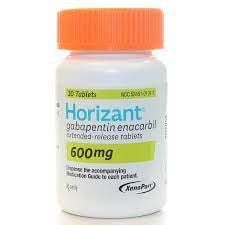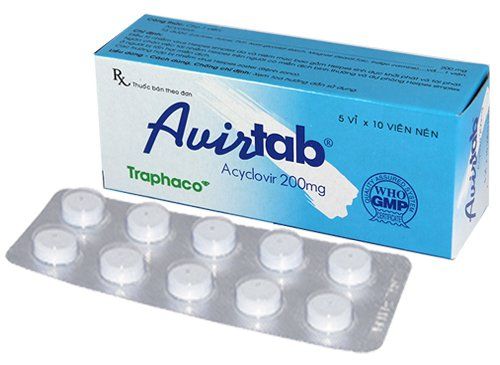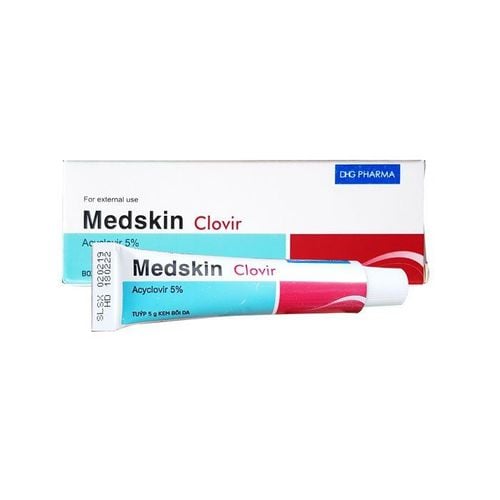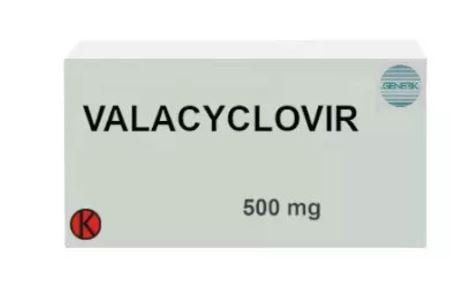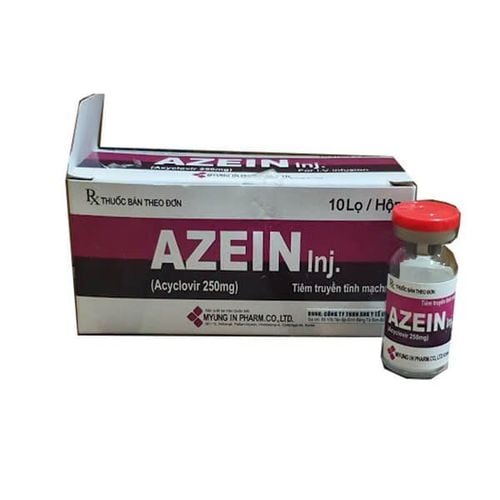This is an automatically translated article.
Lodegald - Aci is used in the treatment and prevention of recurrent Herpes simplex and Varicella zoster infections. The following article will provide some information about indications, dosages as well as notes when using Lodegald - Aci.1. What is Lodegald - Aci?
The drug Lodegald - Aci has the main active ingredient is Acyclovir, the drug is made in the form of tablets with a content of 400mg.Acyclovir is a synthetic purine nucleoside, active against Herpes simplex and Varicella zoster viruses. Acyclovir will be converted to the active form Acyclovir triphosphate to take effect. Acyclovir triphosphate inhibits the enzyme DNA polymerase and the binding of viral DNA, which inhibits DNA synthesis and viral replication without affecting normal cellular metabolism.
The effect of Acyclovir is strongest on Herpes simplex virus type 1 (HSV-1) and less effective on Herpes simplex virus type 2 (HSV-2), Varicella zoster virus (VZV), weakest effect on Cytomegalovirus (CMV) and Epstein Barr.
Currently, in in vitro and in vivo studies, Herpes simplex virus resistance to Acyclovir has increased. It is caused by the appearance of a mutant with a deficiency of the virus' thymidine kinase, which is the enzyme necessary for acyclovir to convert to its active form. Other resistance mechanisms are altered thymidine kinase properties and reduced susceptibility to viral DNA polymerase. Acyclovir-resistant viruses become a problem for immunocompromised patients, especially AIDS patients with cutaneous mucosal Herpes simplex virus infection.
Acyclovir has good effect in the treatment of severe encephalitis caused by HSV-1 virus, helping to reduce the mortality rate from 70% to 20%. Meningitis milder HSV-2 can be treated well with acyclovir.
2. Indications and contraindications of the drug Lodegald - Aci
2.1. Point
Treatment of Herpes simplex virus infections HSV-1 and HSV-2 for the first time and recurrence in the skin and mucous membranes such as stomatitis - gingivitis, genital inflammation; in the eye such as keratitis ; encephalitis - meningoencephalitis. Prophylaxis of HSV infection in skin and mucous membranes with recurrence at least 6 times/year, in eyes (keratitis recurs after 2 times/year), in case of ocular surgery. Varicella Zoster virus infection: Prophylaxis of eye complications caused by shingles. Chickenpox in pregnancy. Neonatal chickenpox. Newborn before the onset of illness: When the mother has chickenpox 5 days before and 2 days after giving birth. Severe chickenpox in children under 1 year of age. Chickenpox has complications, especially pneumonia caused by chickenpox.2.2. Contraindications
Contraindicated in people who are allergic or sensitive to Acyclovir or any of its ingredients.3. How to take Lodegald - Aci
When signs and symptoms suggestive of Herpes simplex or Varicella Zoster infection, treatment should be initiated as soon as possible. The drug Lodegald - Aci is taken orally. Dosage of Lodegald - Aci is adjusted according to the indication and condition of each patient.Primary Herpes Simplex Infections (including Genital Herpes Simplex Infections) The usual dose is 200mg/time x 5 times/day, 4 hours apart. Take the drug for 5-10 days. Patients with severe immunodeficiency, poor absorption: 400mg / time x 5 times / day, used for 5 days. Prophylaxis of relapse in immunocompetent individuals (at least 6 relapses/year): 800 mg/day in divided doses 2 or 4 times/day. The drug must be discontinued after 6-12 months to evaluate the results. If recurrence is rare (< 6 times/year), only treatment for relapse: 200mg/time x 5 times/day, orally for 5 days. Start taking medication when symptoms improve. HSV prophylaxis in immunocompromised patients: 200-400mg/time x 4 times/day Herpes simplex infection in the eye Treatment of keratitis: 400mg/time x 5 times/day, used for 10 days. Prophylaxis of recurrent keratitis (after 3 relapses/year): 400mg/time x 2 times/day. After 6-12 months of treatment, the response should be re-evaluated. In case of eye surgery: 400mg/time x 2 times/day. Zona: Adults and children 2 years of age and older: 800mg/time x 5 times/day, orally for 5-10 days. Children under 2 years old: 1/2 adult dose Chickenpox: Adults: 800mg/time x 4-5 times/day, used for 5-7 days. Children 2 years and older: 20mg/kg x 4 times/day, maximum 800mg/time. Drink for 5 days. Children under 2 years old: 200mg/time x 4 times/day. Or children from 2 to 5 years old: 400mg/time x 4 times/day. Children 6 years and older: 800mg/time x 4 times/day. Patients with renal impairment: Dosage and frequency of taking Lodegald - Aci must be changed depending on the degree of renal function impairment:
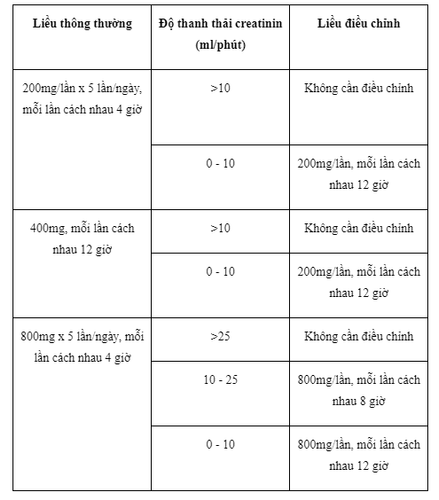
4. Undesirable effects when using Lodegald - Aci
Gastrointestinal: Vomiting, nausea, abdominal pain, loss of appetite, diarrhea. Blood and lymphatic system: Anemia, leukopenia, lymphadenitis, thrombocytopenia. Neurological: headache, dizziness, agitation, tremor, insomnia, nervous disorders, hallucinations, psychotic symptoms, convulsions, coma. Respiratory: Difficulty breathing. Hepatobiliary: Increased bilirubin and liver-related enzymes, liver stones, jaundice. Urinary system: Increased blood urea and creatinine, acute renal failure. Skin: Rash, itching, urticaria, photosensitivity, alopecia. Adverse effects encountered when using Lodegald - Aci drugs are rare, mild and self-resolving. If there are severe symptoms such as confusion, coma in patients with renal failure, it is necessary to stop using Lodegald - Aci and go to a medical facility for timely treatment.5. Some notes when using Lodegald - Aci
Patients with Renal Impairment: Acyclovir is excreted by the kidneys; therefore, dose adjustment is required in patients with renal impairment. Elderly patients: There may be decreased renal function, so the dose should be adjusted in this group. Elderly and renally impaired patients both have an increased risk of neurological adverse events, so close monitoring when using Lodegald - Aci in these two groups. In general, neurological reactions are reversible upon discontinuation of the drug. Long-term or repeated treatment with Lodegald - Aci in severely immunocompromised patients may reduce the sensitivity of viral strains that do not respond to treatment with Acyclovir. Hydration Status: Care should be taken to maintain hydration in patients receiving high doses of acyclovir. Concomitant use of Lodegald - Aci with other nephrotoxic drugs increases the risk of renal failure. Pregnant women: Lodegald - Aci should only be used when the potential benefit outweighs the possible risk to the fetus. Lactation: Acyclovir is excreted in breast milk when administered orally. However, to date, there have been no reports of adverse effects on the nursing infant when the mother took acyclovir. Acyclovir should be used with caution in lactating women.6. Drug interactions
Probenecid: Increases plasma half-life and AUC of acyclovir, decreases urinary excretion and clearance of acyclovir. Zidovudine: Concomitant use with acyclovir may cause lethargy and lethargy. Monitor the patient closely while taking Lodegald - Aci. Interferon: Concomitant administration enhances the anti-HSV-1 invitro effect of acyclovir. Amphotericin B and Ketoconazole: Increase the antiviral potency of Acyclovir.Please dial HOTLINE for more information or register for an appointment HERE. Download MyVinmec app to make appointments faster and to manage your bookings easily.




